Pimpri-Chinchwad: PCMC Launches Climate Budget Training Workshop & Guidebook | Sourced
Pimpri-Chinchwad Municipal Corporation’s (PCMC) City Transformation Office (CTO) has commenced a pivotal training workshop on climate budgeting for various departments. The workshop, which began on Monday is designed to empower the Environment and Drainage, Civil, Electrical, Water Supply and Health departments with the tools and knowledge needed to integrate climate priorities into their financial planning.
On Tuesday, PCMC Commissioner Shekhar Singh inaugurated the Climate Budget guidebook, a comprehensive reference document to guide departments in aligning their budgets with climate goals. Commissioner Singh on the launch occasion said, “The Climate Budget Guidebook is not just a technical manual; it is a roadmap for sustainable urban governance. It will serve as a crucial resource for all departments as we work collectively to make Pimpri-Chinchwad a leader in climate-responsive development.”
The guidebook outlines actionable frameworks for identifying, prioritising, and tracking climate-friendly initiatives. It aligns with the Green City Action Plan (GCAP), which focuses on reducing greenhouse gas emissions and enhancing the city’s resilience to climate change.
Chief Accounts and Finance Officer (CAFO) Pravin Jain emphasising the importance of this initiative said, “Climate budgeting is a transformative approach to fiscal planning, ensuring that our investments contribute to long-term sustainability. This workshop, supported by the Climate Budget guidebook, will enable departments to strategise effectively, track emissions and achieve measurable results while positioning PCMC as a leader in green urban development.”
Visionary step for climate action
The Climate Budget framework ensures that every rupee allocated by the city either directly or indirectly contributes to reducing carbon emissions and strengthening climate resilience. This brings Pimpri-Chinchwad into the ranks of global leaders like Oslo, London, New York and Mumbai, who have adopted similar frameworks to tackle the growing climate crisis.
Pimpri Chinchwad’s Climate Budget framework has set its sights on four key areas:
1. Built Environment & Energy: Reducing energy consumption through green buildings and renewable energy initiatives.
2. Transportation: Encouraging clean-energy transport systems, such as electric vehicles (EVs) and public transit.
3. Solid Waste Management: Improving waste recycling and reducing landfill use through waste-to-energy projects.
4. Water & Wastewater Management: Enhancing the city’s water resilience through rainwater harvesting, wastewater recycling, and stormwater management.
